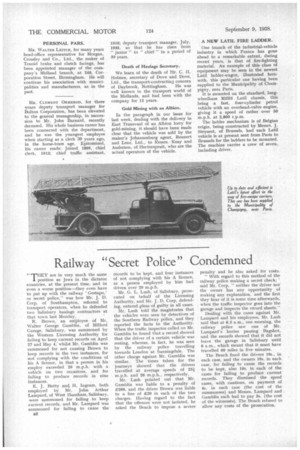Railway "Secret Police" Condemned
Page 36

If you've noticed an error in this article please click here to report it so we can fix it.
" THEY are in very much the same
1 position as Jews in the dictator countries, at the present time, and in even a worse position—they even have to put up with the railway 'Gestapo,' or secret police," was how Mr. J. D. Corp, of Southampton, referred to transport operators, when he defended two Salisbury haulage contractors at that town last Monday.
R. Brown, an eniployee of Mr. Walter George Gamblin, of Milford Garage, Salisbury, was summoned by the Western Licensing Authority for failing to keep current records on April 27 and May 4, whilst Mr. Gamblin was summoned for not causing Brown to keep records in the two instances, for not complying with the conditions of his A licence, in that a person in his employ exceeded 20 m.p.h. with a vehicle on two occasions, and for failing to produce records in nine instances.
E. J. Batty and H. Ingram, both employed by . Mr. John Arthur Lampard, of West IIarnham, SaliSbury, were summoned for failing to keep current records, and Mr. Lampard was summoned for failing to cause the
a2 records to be kept, and four instances of not complying with his A licence, as a person employed by him had driven over 20 m.p.h.
Mr. G. L. Lush, of Salisbury, prosecuted on behalf of the Licensing Authority, and Mr. J. D. Corp, defending, entered-pleas of guilty in all cases.
Mr. Lush told the magistrates that the vehicles were seen by detectives of the Southern Railway police, and they reported the facts to the Authority. When the traffic inspector called on Mr. Gamblin he found that a record showed that the driver of a certain vehicle was resting, whereas, in fact, he was seen by the railway police travelling towards London at Sunningdale. The other charge against Mr. Gamblin was similar. The times taken for the journeys showed that the drivers travelled at average speeds of 25i m.p.h. and 26 m.p.h., respectively.
Mr. Lush pointed out that Mr. Gamblin was liable to a penalty of £260, and the driver Brown was liable to a fine of £20 in each of the two charges. Having regard to the fact that the offences were not isolated, he asked the Bench to impose a severe penalty and he also asked for costs.
" With regard to this method of the railway police making a secret check, ' said Mr. Corp, "neither the driver nor the owner has any opportunity of making any explanation, and the first they hear of it is some time afterwards, when the traffic inspector goes into the garage and inspects the retord sheets."
Dealing with the cases against Mr. Lampard and his employees, Mr. Lush said that at 6.5 a.m., one morning, the railway police saw one of Mr. Lampard's lorries passing Bagshot, and the records showed that it did not leave the garage in Salisbury until 6 a.m., which meant that it must have travelled 60 miles in five minutes.
The Bench fined the drivers 10s.. in each case, and the owners 10s. in each case, for failing to cause the records to be kept, also 10s. in each of the cases for failing to produce current records. They dismissed the speed cases, with cautions, on payment of 4s. in each case (the cost of the summonses) and Messrs. Lampard and. Gamblin each had to pay 5s. (the cost of the witnesses). The Bench refused to allow any costs of the prosecution.




















































































